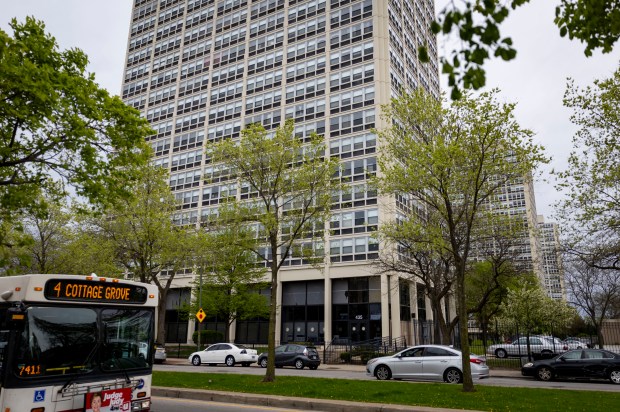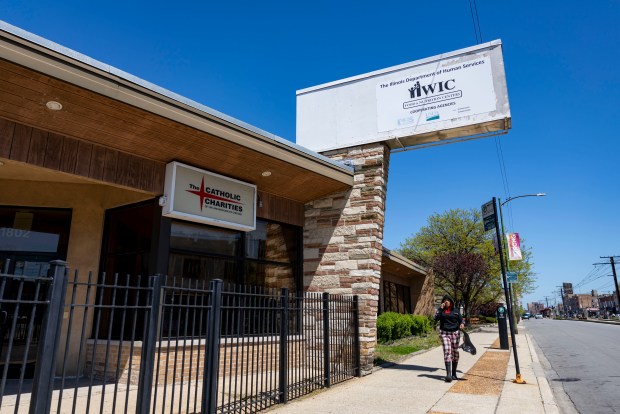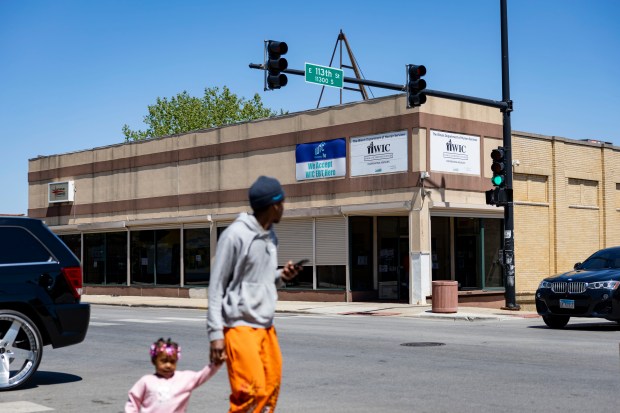U.S. Rep. Jonathan Jackson is spending federal tax dollars to rent a congressional district office on the South Side from his longtime business partner, powerful city developer Elzie Higginbottom, at more than twice the rate paid by the previous tenant.
Jackson last spring moved the district office into the first floor of a high-rise in the Theodore Lawless Gardens apartment complex that is owned and managed by Higginbottom. A Chicago political powerbroker who has been an ally of Illinois governors and Chicago mayors for decades, Higginbottom is a close friend of the Jackson family, including the congressman’s father, civil rights leader the Rev. Jesse Jackson.
The younger Jackson and Higginbottom have also been business partners for more than 27 years, according to land records and disclosure statements. The pair co-owns two South Side buildings they lease for grocery stores serving recipients of a federal program that helps pay for groceries for low-income mothers and their young children.
The partnerships that own the stores made Jackson more than $100,000 in 2022 and between $50,001 and $100,000 the following year, according to Jackson’s federal financial disclosure reports.
Long-standing House rules — put in place to prevent the misuse of taxpayer funds for district office rentals — typically ban members of Congress from leasing from anyone with whom they have or had a professional, legal, or family relationship. The same rules also require a fair market rate to be paid based on an arm’s-length transaction.
While a spokesman for Jackson acknowledged the congressman’s long-standing business relationship with Higginbottom, he said Jackson has not violated those House rules because he and Higginbottom have not had any new business ventures or other “financial interdependence since congressman Jackson took office.”
The spokesman, Robert Patillo, said the situation was discussed with the House Committee on Ethics and the House’s chief administrative officer and that “approval was granted based on compliance with guidelines.”
Patillo added that while Jackson still has “ownership interests in long-standing real estate partnerships established in the 1990s, those entities operate independently and require no ongoing involvement.”
“The lease was reviewed and approved by House authorities. The Congressman fully disclosed the partnership history and sought written clearance,” Patillo wrote in a statement to the Tribune. “Based on documentation and the nature of the passive ownership, it was determined not to violate House rules.”
The Tribune requested copies of any written approvals Jackson received, but the congressman’s office did not provide any. The House Ethics Committee is not allowed to make such guidance public because those communications are considered confidential. The House’s chief administrative officer referred the Tribune’s inquiries for the approvals to Jackson’s office.
Beginning about one year ago, Jackson began paying Higginbottom’s company $3,500 per month for the office space at 435 E. 35th St., according to House records.
The previous tenant, former Ald. Sophia King, 4th, rented the same space for her aldermanic office for $1,500 per month, less than a year before Jackson moved in, public records show, while the neighboring tenant in the same building, state Rep. Kam Buckner, pays $1,100 per month for a smaller space.
Patillo said the rates paid by previous tenants reflect older lease terms and that the agreement between Jackson and Higginbottom was fair. He also said the office has been improved, including upgraded security, disability compliance retrofitting and enhanced constituent service areas.

“The agreement reflects market conditions as of early 2024, and we sought and received certification from the House that it met the criteria for fair market value and arm’s-length status,” Patillo wrote.
In a short statement, Higginbottom also defended the lease and said Jackson was paying a fair market rate.
Experts raise questions
Ethics experts said Jackson’s district office lease with Higginbottom appears on its face to violate the House rules because the men have a professional business relationship through the co-ownership of the grocery store buildings.
Craig Holman, an ethics expert with Public Citizen, a nonprofit advocacy organization, noted that even though the business relationship between Jackson and Higginbottom began years ago, it’s still ongoing.
Jackson may have gotten the “green light, but that doesn’t mean he didn’t violate the rule,” Holman said. “I see it as an obvious violation of the House rule.”
Holman said, in his view, the House Ethics Committee is not an independent arbiter of ethical rules in Congress and “has long seen its role as burying these types of scandals.”
“The last thing they really want to do is rein in one of their own,” he said.
Kedric Payne, senior director of ethics for the Campaign Legal Center, a Washington-based government watchdog, said the rules are “very specific; you can’t spend money on anyone with whom you have this business relationship.”
“Voters have a right to know that members of Congress are good stewards of taxpayers’ funds and are complying with all the rules,” Payne said. “This situation raises red flags as to whether there is compliance.”
“It could cause voters to question whether the congressman is properly using their money,” he added.

Jackson was only 30 when he first bought one of the South Side grocery store buildings with Higginbottom. At the time, he was a construction manager for Higginbottom’s East Lake Management & Development, five years after he had received an MBA from Northwestern University’s Kellogg School of Management. Jackson worked for Higginbottom from 1995 to 1999.
The district office space is not the first time Jackson has leased office space from Higginbottom.
As a private businessman before he ran for Congress, Jackson leased an office in a Higginbottom-owned building for $1,000 per month — rent he didn’t pay for five years, according to internal records Higginbottom submitted to Cook County taxing authorities.
The building’s rent records show Jackson’s firm owed $60,000 as of December 2021, a month before he announced his run for Congress.
In his statement, Patillo said Jackson disputes the $60,000 amount and said discussions with East Lake in 2022 led to a “mutual acknowledgment that the space in question was not actively used after a point, and no further rent was accrued.”
“The amount has not been waived or forgiven, nor does it represent a current, enforceable debt,” Patillo said.
He did not provide any further explanation.
Moving district offices
When members of Congress rent space for their district offices, they are allowed to use taxpayer dollars but they and their landlords are required to sign the lease and a lease attachment that states: “The Lease or the Amendment is entered into at fair market value as the result of a bona fide, arms-length, marketplace transaction. The Lessor and Lessee certify that the parties are not relatives nor have had, or continue to have, a professional or legal relationship (except as a landlord and tenant).”
House lawyers must review and approve the lease and lease attachment before any payments are made, but those documents are not public records and Congress is not subject to the Freedom of Information Act.
The only lease records Congress discloses are in the telephone book-sized quarterly statements of disbursements released by the House’s chief administrative officer. Those reports disclose the names of landlords, monthly rents and dates the rents were paid.
The Tribune requested that Jackson and Higginbottom provide copies of the district office lease and lease attachment, but neither did.
When Jackson first took office in January 2023, he initially moved into the district space used by his predecessor, Bobby Rush, in the Morgan Park neighborhood at 11750 S. Western Ave.
The monthly rent, paid to a California businessman, was $6,400 for 4,000 square feet of space, according to House disbursement reports and records filed with the Cook County assessor’s office. That’s about $19 per square foot.
But in March of 2024, Jackson ended the lease in Morgan Park and began renting the commercial space from Higginbottom, which is on the west side of the high-rise on East 35th Street.
Records Higginbottom filed with the county assessor state that the office space now rented by Jackson and previously occupied by King is 1,000 square feet. Patillo said, based on an independent measurement conducted in April 2024, the space is actually 1,200 square feet.

At a $3,500 per month rental rate, Jackson is paying about $35 per square foot for a 1,200 square foot office, while King’s rate would be $15 per square foot.
On the east side of the same building is the other commercial tenant, state Rep. Buckner, who pays $1,100 per month for 750 square feet, according to state and county records. His rent comes to $17.60 per square foot.
Unlike Congress, both the city and state governments made copies of the King and Buckner leases available under FOIA.
Higginbottom did not address his business relationship with Jackson and only provided a brief statement in which he stated the space being leased to Jackson was 3,000 square feet.
“This equates to $14 per square foot; his rent includes some storage space on the lower level, a few reserved parking spaces and the landlord pays all utilities. In our opinion these terms are at or below the market rate,” Higginbottom said.
Higginbottom declined to answer any follow-up questions about the nature of the 2,000 additional square feet, saying, “We have no further comment. The space is 3,000 sf.”
In the statement from Jackson’s office, Patillo never said the full size being rented by the congressman was 3,000 square feet.
The appraisal Higginbottom submitted to the county assessor’s office describes a 5,000-square-foot basement utilized as mechanical and storage space, and 250,000 square feet of asphalt parking.
King said in an interview that when she rented the office, she and her aldermanic staffers had access to a “huge, huge storage area in the basement” for files and other items “but it’s not really leasable space.” She added that she and the staffers had “access to parking” but mostly parked on the street.
Under the terms of King’s 2022 lease, the city also provided Higginbottom with a one-time payment of $17,000 for improvements she had requested.
“We added a conference room, and a couple of offices. It was one big room before,” she said. “We took an opportunity to upgrade an office that needed improvements.”
She said Jackson is “benefiting” from the improvements she initiated and said if she owned the building, she would charge more than the rent she paid.
“Sure. Sure. It’s a great space,” King said. “I would say that, yes, if I were an owner, I could certainly see leasing it for twice what we paid.”
King stepped down as alderman in May 2023 after unsuccessfully running for Chicago mayor, leaving her office suite in the building vacant until Jackson moved in 10 months later.
Buckner, interviewed in Springfield, said he does not have parking or storage as part of his lease.
Ownership of WIC stores
For 2022, the year Jackson first ran for Congress, the two real estate partnerships he co-owns with Higginbottom were among his largest sources of income, according to his congressional disclosure reports. The pair leased the buildings to Catholic Charities to operate two federally subsidized grocery stores.
Jackson has a 40% interest in both partnerships, Patillo said.
Leases of the buildings at 1802 E. 71st St. and 11255 S. Michigan Ave., obtained under the Illinois Freedom of Information Act, show Catholic Charities pays $560,359 in rent per year — money ultimately from federal taxpayers — to the Higginbottom-Jackson partnerships for the two stores.


With a 40% ownership in both properties, that means Jackson’s share of the rents could be as much as $224,000 per year before expenses such as property taxes.
“His share of the income is subject to variable expenses, including taxes, insurance, and maintenance,” Patillo said in the statement. “The exact net income varies by year.”
The partnerships are responsible for some expenses, such as property taxes, most recently set at $81,529 a year, but Catholic Charities pays for utilities and routine maintenance, records show.
In financial disclosure statements that members of Congress are required to submit annually, Jackson reported that the partnerships earned him more than $100,000 in 2022 and between $50,001 and $100,000 in 2023.
The stores provide free food subsidized by the federal Women, Infants, and Children, or WIC, program, which Jackson has consistently supported while in Congress.
So while the program benefits poor families, it also benefits Jackson and Higginbottom as landlords.

Since taking office, Jackson has co-sponsored a bill to expand WIC eligibility, voted down Republican efforts to limit benefits and voted for the budget deal last year that increased the WIC program’s funding.
Jackson’s actions supporting the WIC program in Congress do not appear to be breaches of congressional ethics, even though he tangentially benefited from the moves, said Payne of the Campaign Legal Center.
While congressmen can’t ethically vote on legislation that is “particular to you,” they may vote on legislation that is part of “a class,” Payne said.
“If you own a farm, you can vote on farm legislation,” Payne said.
In 2023, House Republicans tried to ax $800 million from the proposed WIC budget, as well as severely slash the per-person benefits for fruits and vegetables, moves Democrats, including Jackson, opposed. In contrast, the Senate overwhelmingly passed an appropriations bill with all the funding the Biden administration requested for WIC. Then, as a result of negotiations, the House, including Jackson, ultimately approved the Senate version, and it became law in March 2024.
“Congressman Jackson supports WIC funding as a lifeline for mothers and children in food-insecure areas. His support for this program is policy-driven, grounded in community needs, and entirely separate from any legacy real estate ownership that predated his time in office,” Patillo said.
Catholic Charities, which operates the WIC stores under a federally funded contract with the state of Illinois, has leased the buildings from the partnerships owned by Jackson and Higginbottom for more than 27 years, land records show.
Catholic Charities said in a statement that it was unaware the congressman was one of the owners of the properties.
The charity’s “day-to-day dealings are with East Lake Management,” said Mary Krinock, Catholic Charities’ then-chief of staff, in a statement last year. “We have not interacted with Jonathan Jackson, nor is he named in any of the lease documentation.”
Krinock no longer works for Catholic Charities. But a current spokesperson confirmed the nonprofit still rents the two buildings.
WIC, formally known as the Special Supplemental Nutrition Program for Women, Infants and Children, provides food for 6.8 million pregnant women, new mothers, infants, and children under 5, including 173,000 people in Illinois, according to the U.S. Department of Agriculture, which administers the program.
Lease documents indicate Catholic Charities has paid a total of $15.3 million in rent for the two buildings since 1996 and 1997, the years the partners purchased the buildings and started renting them out as WIC grocery stores.
Catholic Charities operates 14 WIC stores in Chicago — it leases 11 of them from Higginbottom, including the two he co-owns with Jackson.
Available records indicate Higginbottom is the 100% owner of most of the other nine properties. Higginbottom has few partners in his dozens of business deals, records show, typically owning his investments outright.
Jackson is an exception.
In a statement, Higginbottom said: “Over the past 50 years, Elzie Higginbottom and East Lake Management have partnered with and supported hundreds of Black-owned businesses and black entrepreneurs. Congressman Jonathan Jackson has long been an entrepreneur in Chicago, and we have been proud to support his efforts.”
In a general response to questions, Jackson noted his financial disclosures “are current, accurate and a matter of public record. Since my 2022 election, I closed my businesses and now maintain a passive interest in real estate holdings and partnerships.”
Chuck Neubauer and Sandy Bergo are freelance reporters based in the Washington, D.C., area.
Chicago Tribune’s Jeremy Gorner contributed.





